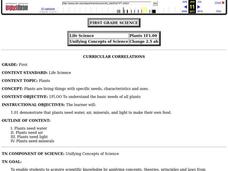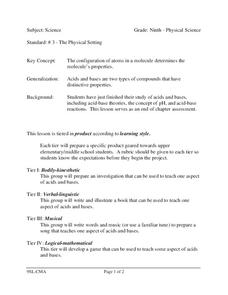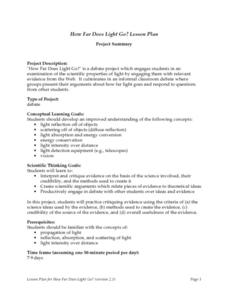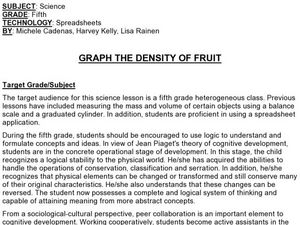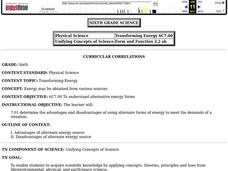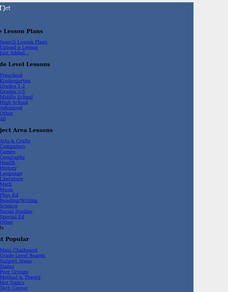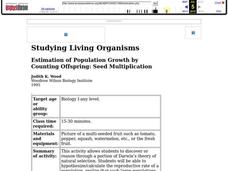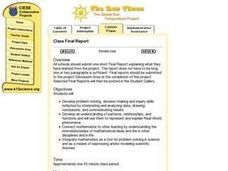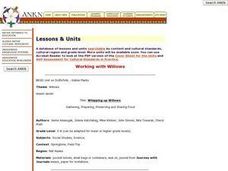Curated OER
Plants
First graders explore the specific needs, characteristics, and uses of plants. They discuss the needs of plants as they grow. Students observe plants in various settings as they grow and note the changes they see.
Curated OER
The Effects of Temperature on Solids
Young scholars explore the effects that extreme temperatures have on the material properties of solids. They investigate the properties of a material whose state depends on extreme temperatures and witness how it interacts with room...
Curated OER
The Physical Setting
Ninth graders study the configuration of atoms in molecules to see that it determines the molecule's properties. In this chemistry lesson students divide into groups and complete their assigned task.
Curated OER
From Molecules to Mole Day Do's
Students recognize methods used to define the mole. After converting various quantities to the mole, students provide a context for understanding the usefulness of scientific notation and the mole.
Curated OER
How Far Does Light Go?
Students engage in research from the internet to search for facts concerning the scientific properties of light. The information is collected in order to gather evidence for a classroom debate. The debate includes a question and answer...
Curated OER
Graph the Density of Fruit
Fifth graders review the definition of mass and volume. They calculate and graph the density of various types of fruit while working in groups on a spreadsheet program. They look at how size of the fruit can be similar but the weight is...
Curated OER
Plants
Students plant bean seeds and draw pictures of the plants as they grow. They create their own garden, plant the seeds, and keep a journal of their growth.
Curated OER
Machines: Useful But Dangerous
First graders study, observe, and use a simple machine. They study necessary safety and review posted safety rules related to using a machine and identify strategies for reporting any accidents or injuries.
Curated OER
Transforming Energy
Sixth graders study about alternate energy sources and discuss with their neighbor how alternative energy sources affect environmental conditions so that an entire species could be affected.
Curated OER
Numerical Determination of Drag Coefficients
Young scholars create a video of an object falling with a drag. In this physics instructional activity, students calculate drag coefficient using data from Logger Pro. They calculate velocity and acceleration of the object.
Curated OER
Oscar Grammar
Students practice listening, grammar skills and reading comprehension as they complete an "Oscar (the dog) Grammar" worksheet.
Curated OER
Draw your Conclusions
Learners analyze data from a student discussion website and write a report on the outcome of an investigation regarding their local water quality. As part of a larger unit students then post the summary of their investigation on the...
Curated OER
Mixed Media Weaving
Students will demonstrate the ability to create the illusion of space by overlapping shapes.They will recognize the differences between art materials, techniques, and processes. Students will demonstrate the influence of personal...
Curated OER
Estimation of Population Growth By Counting Offspring: Seed Multiplication
Learners calculate the reproductive rate of a plant that creates multi seed fruits. They graph exponential growth and the complete a series of questions that help them infer that natural selection processes are at work in this population.
Curated OER
How Many Regular Polyhedrons Are There In This or Any Universe?
Students examine the idea of "regularity" as it pertains to geometry. In this geometry lesson students complete several assignments that are part of trihedral angles and regular polyhedrons.
Curated OER
Class Final Report - Global Sun Temperature Project
Students reflect on the data they have analyzed during the Global Sun Temperature Project. They use the project website as a resource for their observations, draft a class report and post it on the Internet.
Curated OER
How Does Climate Affect Your Environment?
Students access the Global Sun Temperature Project website and research the relationship between the location and climate of a participating school to its building structure. They consider how climate affects the type of structures...
Curated OER
Whipping up Willows
Students use the information they were able to discover from elders and community members as a basis for their study of ows. This lesson leads to a time of sharing with the elders and community members who provided information to Students.
Curated OER
How Science Works: Natural Selection
Students are introduced to the topic of adaptation and discuss how various animals adapt to their environment. In groups, they participate in a simulation in which they are selected based on criteria. They discuss the results and relate...
Curated OER
On the Surface
Students draw and label the 15 major rivers in Texas. They then draw and label another map with the major lakes and reservioirs of Texas. Students use the maps and locate and label the location of the following major Texas cities:...
Curated OER
Change by Chance?
Sixth graders are able to see the role of chance in evolution. The activity is similar to the party game "gossip" or "telephone." Students start off with a drawing of an animal which changes as they pass their copies of the animal to...
Curated OER
Orfeo: Sinfonie e Ritornelli
Students identify the dramatic expression made by performance and how it relates to the content of the story L'Orfeo. They determine the form of orchestra and each instrumental group within the orchestra for this piece.
Curated OER
Laetoli Trackway Puzzle
Students try to reach a "best explanation" after viewing diagrams. In this trackway lesson students complete several worksheets, make observations and hypothesize.
Alabama Learning Exchange
Action at Plate Boundaries
Students diagram the spreading of the ocean floor. In this earth science lesson plan, students read an article on plate boundaries of the ocean. Students are expected to diagram the oceanic convergent boundary, and...


